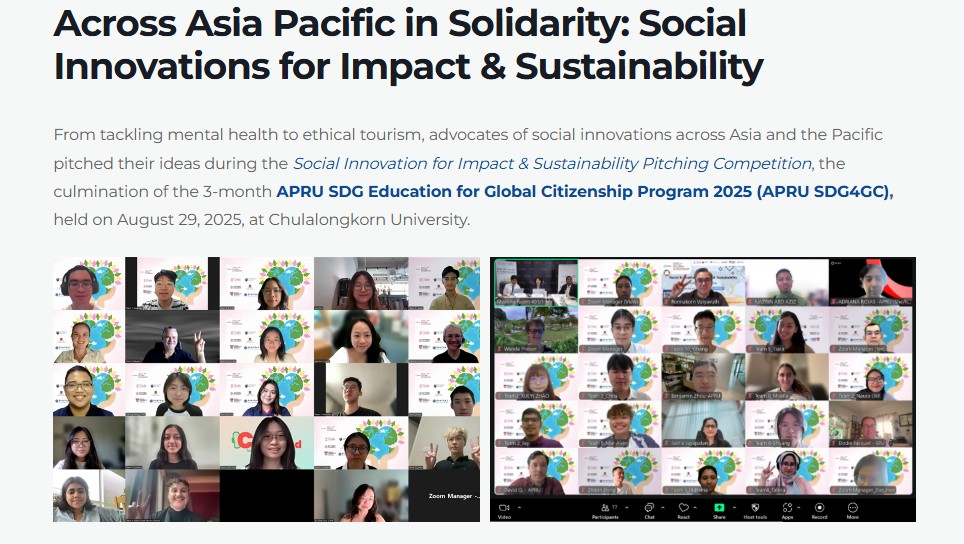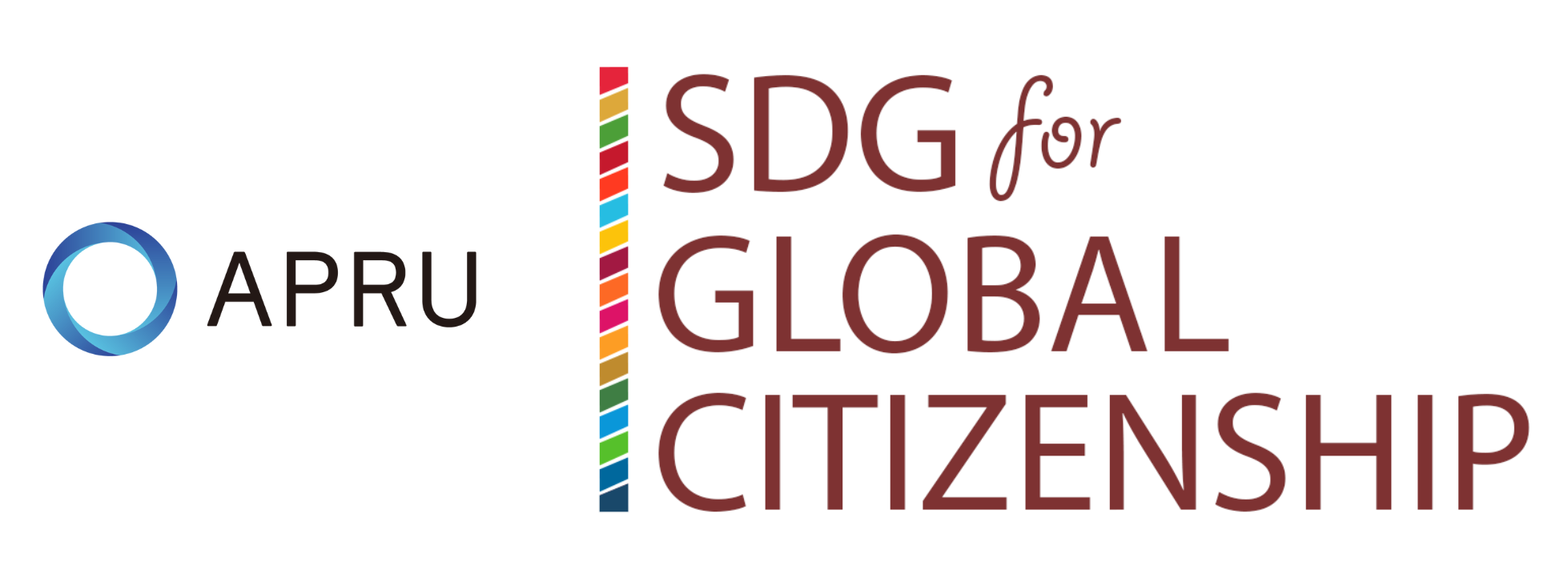
Across Asia Pacific in Solidarity: Social Innovations for Impact & Sustainability
From tackling mental health to ethical tourism, advocates of social innovations across Asia and the Pacific pitched their ideas during the Social Innovation for Impact & Sustainability Pitching Competition, the culmination of the 3-month APRU SDG Education for Global Citizenship Program 2025 (APRU SDG4GC), held on August 29, 2025, at Chulalongkorn University.


Co-hosted by the Office of International Affairs and Global Networks and the Chulalongkorn School of Integrated Innovation (CSII) in collaboration with the United Nations, this hybrid event brought together 10 diverse teams composed of 72 students from 17 universities across 16 countries and economy. Each team pitched innovative social projects aimed at addressing real-world challenges, with a strong emphasis on inclusivity and sustainability in alignment with the UN Sustainable Development Goals (SDGs).

The program was officially opened by Associate Professor Palanee Ammaranond, Ph.D., Vice President of Chulalongkorn University, who underscored the power of social innovation in transforming the lives of vulnerable and underserved communities. CSII Deputy Director, Dr. Ronnakorn Vaiyavuth further emphasized this point, stating, “Social innovation is not about having a perfect marginal solution. It’s about becoming an expert on a problem — caring deeply enough to try, learn, and keep trying again and again,” reminding all participants the essence of social innovation in today’s world.

Ten Teams, Ten Bold Ideas
- CareVend (Winner, Team 1): A vending machine that accepts plastic waste as currency in exchange for sanitary pads, tackling both period poverty and plastic waste (SDGs 3, 5, 10, 12, and 17)
- Teach4Bajau (Team 2): A community-driven learning program co-designed with the Bajau children, which aims to empower them with skills, such as leadership, English, cultural pride and identity, and numeracy to promote social inclusion and create a future beyond survival (SDGs 1, 4, 8, 10, and 16)
- CarePair (Team 3): A mental health app designed for Malaysian students, combining both professional consultation and buddy support, aims to bridge the gap between stigma and professional help and improve affordability and accessibility (SDGs 3, 4, and 17)
- BridgeLearn (Team 4): The world’s first offline-first universal education platform aims to help billions of excluded learners across the globe through a sustainable three-layer technology platform, such as SMS learning bridge, smart textbook system, and AI learning pods (SDGs 3, 4, 8, 10, 16, and 17)
- AquaPulse (Team 5): An innovative tool designed to provide real-time, data-driven insights that directly address the critical needs of coastal communities and fishermen to ensure safe and sustainable fishing (SDGs 2, 4, 8, 12, 13, 14, and 17)
- Recy-Cool (Team 6): A gamified recycling app that makes recycling more attractive, interactive, and rewarding and connects users to businesses and municipalities, thereby promoting sustainable consumption and production (SDGs 4, 11, 12, 13, and 17)
- RakRoots (Team 7): An innovative digital platform that directly connects travelers with curated cultural immersion experiences ranging from short workshops to week-long homestays, and through a transparent commission system, this platform ensures fair pay for the local hosts, thereby empowering rural Thai communities (SDGs 8, 10, 11, and 12)
- Little Sprouts (Team 8): A zero-waste nutrition program uniting community gardens, hands-on workshops, and healthy meal designs to make Thai school lunches fresher and more educational (SDGs 3, 12, 13, and 17)
- OpenDoor (Team 9): A digital platform that combines job access, training, and community support to help refugees earn safely, grow professionally, and rebuild their lives with dignity (SDGs 1, 4, 5, 8, 10, and 17)
- BoWen (伯闻) – Bridging China’s Graduate Skills Gap for a Job-Ready Workforce (Team 10): A platform bridging the gap between universities, companies, and students in China to reduce graduate unemployment, which aims to create a sustainable, localized community-based talent ecosystem (SDGs 1, 4, 8, 10, 16, and 17)
Panel of judges:
- Ms. Iwona Spytkowski, Head of Office, UN Resident Coordinator’s Office in Thailand (Chair)
- Mr. Nutthapon Rathie, Head of Experimentation, UNDP Accelerator Lab Thailand
- Ms. Madelyn Almazora, Programme Management Officer and the Regional Advisor, Subregional Office for South-East Asia of the United Nations Economic and Social Commission for Asia and the Pacific
- Dr. Nazrin bin Abd Aziz, Department of Biosciences, Faculty of Science / Innovation Centre in Agritech for Advanced Bioprocessing (ICA), Universiti Teknologi Malaysia (online)

The Winning Team


The winning team is composed of Ananya Varshney (Nanyang Technological University), Han Xiao (The Chinese University of Hong Kong), Kanchanabhadra Sai-Sook (Chulalongkorn University), Quangao Liu (University of Chinese Academy of Sciences), Thayananth A/L Kumaresan (Universiti Malaya), and Zhi Ying Tan (National University of Singapore). CareVend is not only a vending machine that addresses both period poverty and plastic waste, but this innovation project can also generate revenue by upcycling the collected plastic into crafts and other reusable products, showing the potential for sustainable solutions to make a significant impact.
A Call to Action
To conclude the program, Professor Dr. Yvonne Lim Al Lian, Associate Deputy Vice-Chancellor (Academic and International) of Universiti Malaya, reminded participants of the deeper purpose behind their innovations:“Change does not always happen in grand gestures. Sometimes, it begins with the courage to listen, the willingness to include, and the commitment to act even when it’s difficult.”

The competition was chaired by Ms. Michiko Yoshida, Program Chair of the APRU SDG4GC and Director of Global Networking and Engagement Division, Office of International Affairs and Global Network, Chulalongkorn University. She was joined onsite by Lead Mentors and partners, namely, Mr. Savinda Ranathunga, Regional Youth Project Manager, UNDP Asia and the Pacific, Asst. Prof. Dr. Kirati Khuvasanond, Faculty of Education, Mr. Dipesh Poudel, Partnerships and Youth Startup Support Coordinator, UNDP Asia and the Pacific, and Ms. Ruoxiao Song, Youth Empowerment Alliance and Innovative Financing Lead, UNDP. Mr. Pawat Bhiroonjitti, a second-year student from the Faculty of Political Science, served as the MC.

Now in its third year, the APRU SDG4GC Program remains committed to empowering young innovators and fostering global citizenship under the theme: “Diversity and Inclusivity – Actions for Sustainability.”
#SDGs #GlobalCitizenship #Diversity #Inclusivity #ChulaOIA #InternationalGrowth #ImpactfulGrowth #IntegratedGrowth
